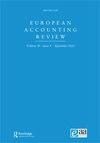Deviations from the Mandatory Adoption of IFRS in Europe? Why Non-Adoption Does Not Mean Non-Compliance
IF 2.7
3区 管理学
Q2 BUSINESS, FINANCE
引用次数: 0
Abstract
Using Worldscope data, Pownall and Wieczynska (2018) [Deviations from the mandatory adoption of IFRS in the European Union: Implementation, enforcement, incentives, and compliance. Contemporary Accounting Research, 35(2), 1029–1066] show that there was extensive non-adoption of International Financial Reporting Standards (IFRS) by European listed firms in 2005–2012. They also suggest that much of this non-adoption is illegal. This would constitute a serious failing by European firms, auditors and regulators. However, in this note we show that there is no non-compliance with mandatory requirements to use IFRS in Germany and the UK in various years including 2012 and 2020. We also find no non-compliance in Austria and Portugal, two countries with less highly regarded enforcement. The reasons for legitimate non-adoption vary by country and by year. Our analysis is based on hand-collected data and it documents that the Worldscope database contains many errors in various fields. Therefore, we provide researchers with a hand-collected database for German and UK firms for the period 2005–2020, which can be used to supplement Worldscope. The database includes information on country of incorporation, whether consolidated financial statements are prepared, the accounting standards applied, and whether the firm is listed on an EU-regulated market. We use the database to provide some evidence on voluntary adoption of IFRS.欧洲强制采用国际财务报告准则的偏差?为什么不收养不代表不遵守
Pownall和Wieczynska(2018)[欧盟强制采用国际财务报告准则的偏差:实施、执行、激励和合规性。]当代会计研究,35(2),1029-1066]表明,2005-2012年,欧洲上市公司普遍不采用国际财务报告准则(IFRS)。他们还表示,这种不收养的行为在很大程度上是非法的。这将构成欧洲公司、审计机构和监管机构的严重失败。然而,在本说明中,我们表明,在包括2012年和2020年在内的各个年份,德国和英国没有不遵守使用国际财务报告准则的强制性要求。在奥地利和葡萄牙,我们也没有发现不遵守规定的情况,这两个国家的执法程度较低。合法不收养的原因因国家和年份而异。我们的分析是基于手工收集的数据,它证明了Worldscope数据库在各个领域都存在许多错误。因此,我们为研究人员提供了一个手工收集的德国和英国公司2005-2020年期间的数据库,可以用来补充Worldscope。该数据库包括公司所在国、是否编制合并财务报表、采用的会计标准以及公司是否在欧盟管制的市场上上市等信息。我们使用该数据库为自愿采用国际财务报告准则提供一些证据。
本文章由计算机程序翻译,如有差异,请以英文原文为准。
求助全文
约1分钟内获得全文
求助全文
来源期刊

European Accounting Review
BUSINESS, FINANCE-
CiteScore
7.00
自引率
6.10%
发文量
58
期刊介绍:
Devoted to the advancement of accounting knowledge, it provides a forum for the publication of high quality accounting research manuscripts. The journal acknowledges its European origins and the distinctive variety of the European accounting research community. Conscious of these origins, European Accounting Review emphasises openness and flexibility, not only regarding the substantive issues of accounting research, but also with respect to paradigms, methodologies and styles of conducting that research. Though European Accounting Review is a truly international journal, it also holds a unique position as it is the only accounting journal to provide a European forum for the reporting of accounting research.
 求助内容:
求助内容: 应助结果提醒方式:
应助结果提醒方式:


